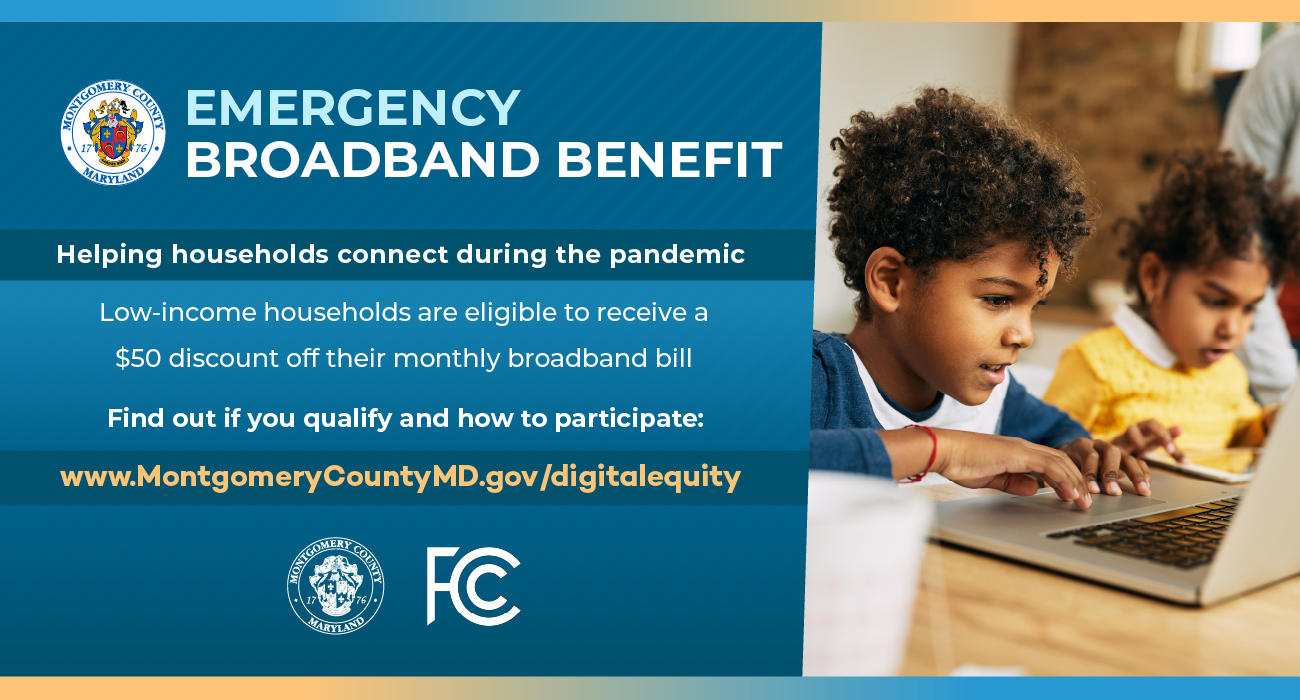The Emergency Broadband Benefit (EBB), an FCC program, will provide low-income households, during the COVID-19 pandemic, with a temporary $50-per-month discount on home internet service. The EBB discount should cover the entire monthly cost of home broadband. The benefit will last until federal funding runs out or six months after the U.S. Department of Health and Human Services declares the pandemic is over.
“Today, I have directed the Office of Broadband Programs and other County departments to help low-income families and families who have experienced a substantial loss of income due to the COVID-19 pandemic sign-up for the federal Emergency Broadband Benefit program,” said Montgomery County Executive Marc Elrich.
There are no long-term contracts required, and providers must get consent to continue providing service after EBB ends so families will not be charged if the EBB ends. The State of Maryland, however, has approved additional funding to continue at least a $15 a month discount for another year after EBB ends.
“There are at least 28,000 Montgomery County families earning less than $50,000 per year who do not have home broadband,” said County Executive Elrich. “Our goal is to get home Internet for at least 10,000 families who don’t have it now.”
"Broadband is a necessity," said Council President Tom Hucker. "This program will make broadband internet more accessible and affordable for families who don't have it at home."
“We are going to need all our community partners who have been helping distribute food and encouraging people to get vaccinated to help us bring home Internet to our residents that don’t have it,” said Councilmember Craig Rice, who co-chairs the National Association of Counties Broadband Task Force.
“The COVID-19 pandemic has highlighted the fact that access to broadband is a socio-economic imperative,” said Councilmember Nancy Navarro. “We must ensure that everyone regardless of their circumstances has access to broadband. Language or socio-economic status must not be a barrier to accessing broadband.”
Households are eligible for the EBB credit of up to $50 off their monthly broadband bill if:
- They are enrolled in Supplemental Nutrition Assistance Program (SNAP), free school lunch, Medicaid, federal housing assistance programs, student Pell Grants, Supplemental Security Income, Veterans Administration Pension or Survivors Benefits, or the current Lifeline or low-cost internet programs (such as from Comcast, RCN, Verizon, or T-Mobile).
- Their income is less than 135 percent of the federal poverty guidelines ($17,226 for a household of one; $23,274 for a household of two; $29,322 for a household of three; or $6,048 more for each additional household member).
- They have lost their job, been furloughed, or applied for or received unemployment benefits any time after February 2020 and their 2020 income was $99,000 or less as a single tax filer, or $198,000 or less as a married couple.
If a household is already enrolled in a low-cost Internet program (such as Comcast Internet Essentials, RCN Internet First, or Lifeline with Verizon or a telephone company), they should contact their provider and request the EBB benefit.
For all other households, it is a three-step process:
- Go to the National Verifier website https://www.getemergencybroadband.org/. After entering contact information, select the program through which the household qualifies. Enter “0000” for the last four digits of the Social Security Number (SSN) to use a passport, driver’s license or state ID, or taxpayer ID number instead of an SSN. Enrollees in Lifeline, Medicaid, and VA programs likely will not need additional documentation. To qualify through other programs, applicants should be prepared to upload a document showing current enrollment (such as letter showing eligibility for housing and lunch programs, or enrollment in SNAP or other programs). If applying between the hours of 9 a.m. and 9 p.m. ET, an Application ID Number will be generated within two to three minutes.
- Contact a broadband provider, select a plan, make an installation appointment, and receive an Account Number. Comcast, RCN, Verizon Fios, and T-Mobile are participating. Other providers offering lower speed wireless broadband with some also offering EBB program smartphones, tablets, or Chromebooks for an additional payment of more than $10 and less than $50 include You Call Wireless, StandUp Wireless, human-I-T, Access Wireless, Sano Health, and good2go mobile.
- Use the broadband provider’s customer service telephone representative or website to opt in and request the EBB credit using the new Account Number and Application ID Number.
For additional information about the Emergency Broadband Benefit, visit https://www.getemergencybroadband.org, or by calling 833-511-0311 between 9 a.m. and 9 p.m. any day of the week. People can apply for EBB online, by telephone, or by mail. Enrollment will take longer if applying by mail.

